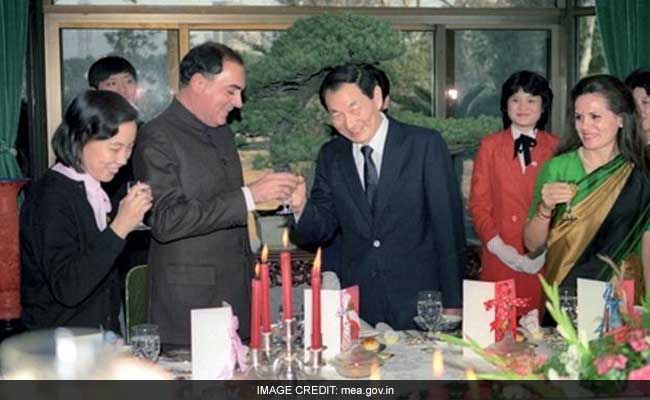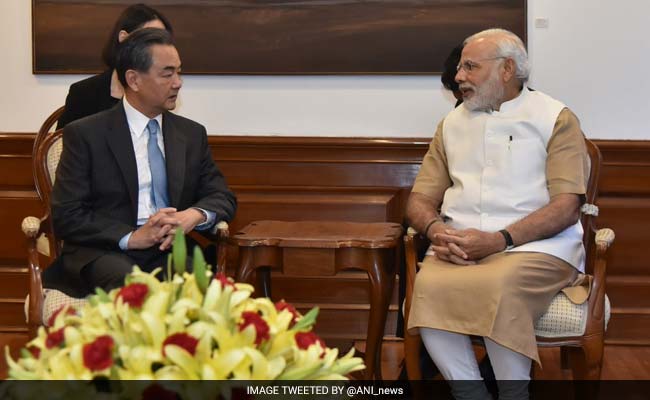I was on the fringe of the most important breakthrough in India-China relations - Rajiv Gandhi's journey to China in December 1988. Preparations had begun nearly four years earlier, on the morrow of his decisive win in the late December 1984 elections, when he had been returned with a thundering majority of over 400 seats. The preparations were at several different levels through our very able and reputed ambassador in Beijing, C.V. Ranganathan, and his highly-trained Chinese-speaking staff in concert with the desk officers in Delhi, most of whom were also experienced China hands. (The Ambassador himself was arguably the best Chinese-speaking Indian Foreign Service officer of his day). The PMO and MEA were brought on the same page.
Second, at the military level. There had been a Chinese incursion at Sumdorong-chu, near the Bhutan border. Even if there was the danger that this might derail the China initiative, our defence forces were told to make it clear to the Chinese that the incursion was unacceptable. There was little ostentatious sabre-rattling but the message went out unambiguously that this was no longer the army of 1962. The Chinese withdrew. And Rajiv Gandhi travelled to Bhutan to reassure the King that there was no danger to his kingdom.

Then Prime Minister Rajiv Gandhi and Sonia Gandhi at a reception hosted in their honour by the Chinese Premier in Beijing (December 1988)
There remained the key question of Arunachal Pradesh that the Chinese called "South Tibet" and wholly claimed. A visit to Mizoram had been scheduled in the spring of 1988 for the swearing-in of the newly re-elected Congress Chief Minister of Mizoram, Lalthanhawla (who is still CM). Prime Minister Rajiv Gandhi decided to avail of the opportunity to announce full statehood for Mizoram that had hitherto been a Union Territory.
In the midst of preparations for this visit, I received instructions, in my capacity as "Manager, Tours and Travels" as one leading journal had my job description, to add a quick trip to Itanagar, the capital of Arunachal Pradesh, to the programme being drawn up for Aizawl at the other end of the North-east region. That presented a logistical nightmare, particularly because night-landing and take-off facilities were few and far between at that time in the North-east. But with the affable cooperation of the wonderful Air Marshall Keeler at Air Headquarters, we were able to sort things out and put Itanagar into the itinerary for the day.
I was standing at the foot of the stage when I heard to my astonishment the Prime Minister conferring full statehood on Arunachal Pradesh! When we were back in the plane, I sought him out in his cabin and asked but what was going to be the impact of this announcement on the proposed China visit. Rajiv Gandhi beamed at me and said, "Mani, if we do not know where the borders of our country lie, how can we expect the Chinese to know?" It worked. India's position had been made crystal clear. The visit to China went forward. A combination of firmness on basics and flexibility on the road ahead ensured that all that was needed to signal the historic breakthrough was Deng Xiao Ping's eight-minute handshake with Rajiv, almost waltzing round the Great Hall of the People for TV cameras the world over to record that a dramatic new chapter had been opened in the relationship between the two Asian giants. Modiji, solid preparatory work, not empty last-minute showbiz gestures, lies at the core of effective diplomacy.

Prime Minister Narendra Modi with Chinese Foreign Minister Wang Yi in New Delhi on Saturday
All this could be put at risk if India does not remain non-aligned in the Second Cold War that shows signs of developing between the US and China. During Modi's state visit to the US last June, Obama declared India a "Major Defense Partner". The capitals M-D-P were provided by the Americans, as was the American spelling of "Defense"! It raises the same question that Nehru asked of Ayub when the Pakistani military dictator and firm military ally of the US suggested a mutual defence pact between his country and ours: "Defence against whom?" If we are going to be a Major Defense Partner of the US in various military adventures that it is prone to embark on in the Asian region on land, sea and air, then we will meet the fate of Pakistan in Cold War I. The Chinese Foreign Minister has very diplomatically and cleverly left it to us to decide what India's stand should be on the South China Sea where US military confrontation with China is being stoked. One prays Modi won't bungle the answer when he meets President Xi.
(Mani Shankar Aiyar is former Congress MP, Lok Sabha and Rajya Sabha.)
Disclaimer: The opinions expressed within this article are the personal opinions of the author. The facts and opinions appearing in the article do not reflect the views of NDTV and NDTV does not assume any responsibility or liability for the same.


